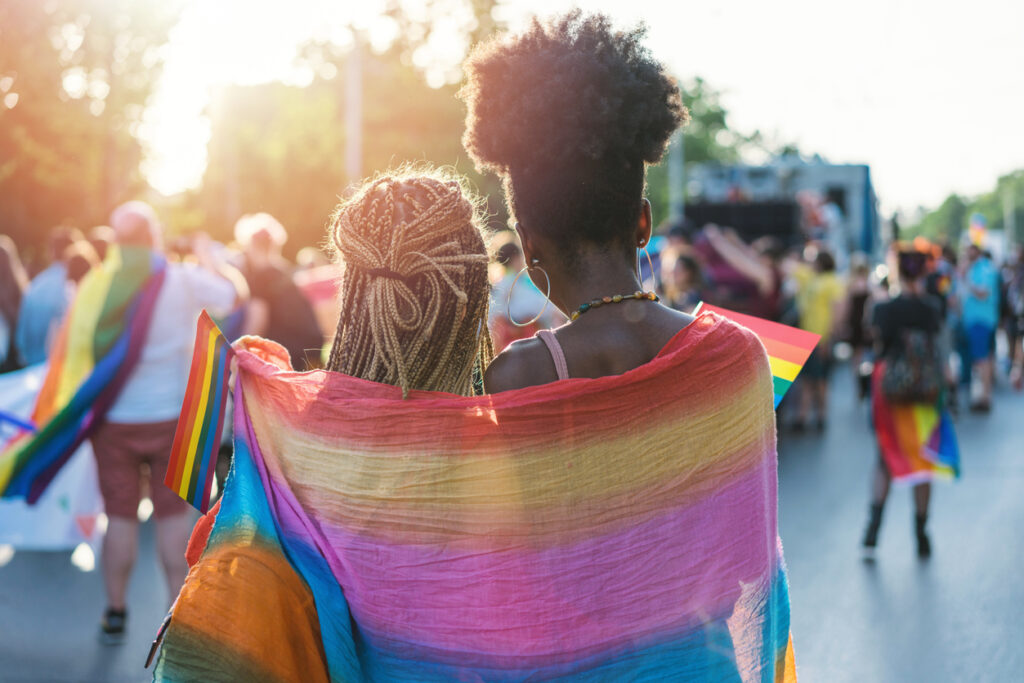“Education is the most powerful weapon which you can use to change the world,” said South Africa’s former president, Nelson Mandela, during a speech commemorating the launch of Mindset Network, a group working to improve education and health in South Africa.
Stamping out rife discrimination is key to creating an inclusive environment, and relevant education is crucial. There’s a lot of debate around the role of diversity, equity and inclusion (DE&I) training and whether current products on the market can combat discrimination at work.
Sadly, many marginalised communities still experience rife discrimination at work. myGwork’s latest research, for example, revealed that 6 out of 10 LGBTQ+ professionals continue to be discriminated against in their place of work and study. Our survey echoes the results of similar studies carried out by LGBTQ+ charity Stonewall, people management organisation CIPD, and the UK’s biggest trade union TUC, which have all raised concerns about the ongoing workplace discrimination experienced by the LGBTQ+ community.
Most LGBTQ+ professionals either return to the closet or leave their jobs usually as a result of commonplace discrimination. In fact, myGwork’s survey found that two-thirds of LGBTQ+ Gen Zers entering the workplace would actually leave their job if they felt they couldn’t be out at work, and more crucially, if they lacked the support of colleagues and allies.
Most of the current general corporate diversity training programmes do little to challenge or stamp out ingrained prejudices, stereotypes and misconceptions.
Lack of relevant workplace LGBTQ+ training and education
Although many professionals want to be an active ally to their LGBTQ+ colleagues, they struggle with effective know-how on how to be one. Their biggest gripe is the lack of relevant DE&I training in the LGBTQ+ space. In fact, a recent LinkedIn poll, carried out by myGwork, suggests that 61% of companies don’t offer this much-needed LGBTQ+ training to their staff.
HR and training department heads are all too aware that education is key to stamping out discrimination and improving allyship at work. However, most general DE&I courses simply aren’t effective enough to deal with the specific challenges that marginalised communities face.
Learning and development experts believe that relevant, practical and engaging training offered throughout the year achieves better success.
However, according to many in the field most of the current general corporate diversity training programmes do little to challenge or stamp out ingrained prejudices, stereotypes and misconceptions. They want training courses that specifically address LGBTQ+ challenges at work and help everyone – be they managers, leaders or colleagues – become better allies.
Managers and leaders are looking for training that provides specific education to help staff, for example:
- Better understand LGBTQ+ history and its context in the workplace
- Gain more knowledge about the complex world of gender identity and expression
- Offer practical rules on how to use pronouns
Ongoing education and training matters
Of course, HR and learning and development managers must ensure that any training is backed up with ongoing educational opportunities. Organisations can do this in a number of ways, including:
1. Run educational workshops and panels through their LGBTQ+ networks/ERGs
This will help employees further explore the issues that the community has faced and continues to battle with in the workplace today. Bringing in influential LGBTQ+ authors, historians and or activists are also a good way to create conversations and much-needed just-in-time learning for employees.
2. Panel discussions
These are also a great way for multiple speakers to engage in more thought-provoking discussions on the topic.
Many external LGBTQ+ organisations and charities host History Month panels too, which you can get involved in if your organisation hasn’t planned anything. These events will often feature panellists who share sections of LGBTQ+ history that they are passionate about, providing great moments of valuable learning.
HR, DE&I, and learning and development managers don’t necessarily need to work harder at making their workplaces more inclusive, they just need to get smarter.
3. Signposting educational resources
Pointing to documentaries, podcasts, books and music that celebrates LGBTQ+ history and culture through your company newsletters and social media platforms will also enable your staff to educate themselves more on the topic and become better allies.
Broadcasters like Netflix and BBC have an extensive library of films, documentaries and series sharing insightful stories and knowledge to celebrate LGBTQ+ History Month.
Providing smart learning opportunities
In short, HR, DE&I, and learning and development managers don’t necessarily need to work harder at making their workplaces more inclusive, they just need to get smarter at providing key learning and training opportunities that are interesting, relevant and practical enough that employees will want to participate in.
The secret is offering year-round, inspiring educational opportunities that will motivate your employees to take the courses and educational opportunities on offer. This will ultimately help to make your workplace more inclusive, and in some small way will play a part in making the world a better one for us all, just as Nelson Mandela had envisioned.
Interested in this topic? Read ‘Why are Pride and Pronouns important?‘
“Education is the most powerful weapon which you can use to change the world,” said South Africa's former president, Nelson Mandela, during a speech commemorating the launch of Mindset Network, a group working to improve education and health in South Africa.
Stamping out rife discrimination is key to creating an inclusive environment, and relevant education is crucial. There’s a lot of debate around the role of diversity, equity and inclusion (DE&I) training and whether current products on the market can combat discrimination at work.
Sadly, many marginalised communities still experience rife discrimination at work. myGwork’s latest research, for example, revealed that 6 out of 10 LGBTQ+ professionals continue to be discriminated against in their place of work and study. Our survey echoes the results of similar studies carried out by LGBTQ+ charity Stonewall, people management organisation CIPD, and the UK’s biggest trade union TUC, which have all raised concerns about the ongoing workplace discrimination experienced by the LGBTQ+ community.
Most LGBTQ+ professionals either return to the closet or leave their jobs usually as a result of commonplace discrimination. In fact, myGwork’s survey found that two-thirds of LGBTQ+ Gen Zers entering the workplace would actually leave their job if they felt they couldn’t be out at work, and more crucially, if they lacked the support of colleagues and allies.
Most of the current general corporate diversity training programmes do little to challenge or stamp out ingrained prejudices, stereotypes and misconceptions.
Lack of relevant workplace LGBTQ+ training and education
Although many professionals want to be an active ally to their LGBTQ+ colleagues, they struggle with effective know-how on how to be one. Their biggest gripe is the lack of relevant DE&I training in the LGBTQ+ space. In fact, a recent LinkedIn poll, carried out by myGwork, suggests that 61% of companies don’t offer this much-needed LGBTQ+ training to their staff.
HR and training department heads are all too aware that education is key to stamping out discrimination and improving allyship at work. However, most general DE&I courses simply aren’t effective enough to deal with the specific challenges that marginalised communities face.
Learning and development experts believe that relevant, practical and engaging training offered throughout the year achieves better success.
However, according to many in the field most of the current general corporate diversity training programmes do little to challenge or stamp out ingrained prejudices, stereotypes and misconceptions. They want training courses that specifically address LGBTQ+ challenges at work and help everyone – be they managers, leaders or colleagues – become better allies.
Managers and leaders are looking for training that provides specific education to help staff, for example:
- Better understand LGBTQ+ history and its context in the workplace
- Gain more knowledge about the complex world of gender identity and expression
- Offer practical rules on how to use pronouns
Ongoing education and training matters
Of course, HR and learning and development managers must ensure that any training is backed up with ongoing educational opportunities. Organisations can do this in a number of ways, including:
1. Run educational workshops and panels through their LGBTQ+ networks/ERGs
This will help employees further explore the issues that the community has faced and continues to battle with in the workplace today. Bringing in influential LGBTQ+ authors, historians and or activists are also a good way to create conversations and much-needed just-in-time learning for employees.
2. Panel discussions
These are also a great way for multiple speakers to engage in more thought-provoking discussions on the topic.
Many external LGBTQ+ organisations and charities host History Month panels too, which you can get involved in if your organisation hasn’t planned anything. These events will often feature panellists who share sections of LGBTQ+ history that they are passionate about, providing great moments of valuable learning.
HR, DE&I, and learning and development managers don’t necessarily need to work harder at making their workplaces more inclusive, they just need to get smarter.
3. Signposting educational resources
Pointing to documentaries, podcasts, books and music that celebrates LGBTQ+ history and culture through your company newsletters and social media platforms will also enable your staff to educate themselves more on the topic and become better allies.
Broadcasters like Netflix and BBC have an extensive library of films, documentaries and series sharing insightful stories and knowledge to celebrate LGBTQ+ History Month.
Providing smart learning opportunities
In short, HR, DE&I, and learning and development managers don’t necessarily need to work harder at making their workplaces more inclusive, they just need to get smarter at providing key learning and training opportunities that are interesting, relevant and practical enough that employees will want to participate in.
The secret is offering year-round, inspiring educational opportunities that will motivate your employees to take the courses and educational opportunities on offer. This will ultimately help to make your workplace more inclusive, and in some small way will play a part in making the world a better one for us all, just as Nelson Mandela had envisioned.








